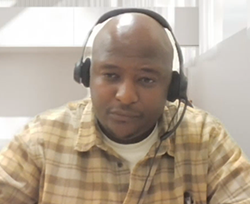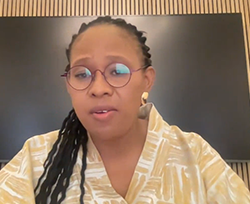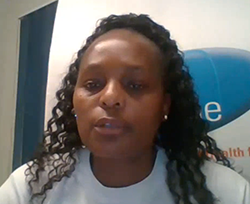South Africa’s femicide rate is five times higher than the global average, and one in three women has experienced gender-based violence (GBV) in her lifetime. Increasingly, this violence is no longer confined to physical spaces. It has migrated to digital platforms such as social media, messaging apps and online forums, where abuse is amplified, often anonymously, and even across country borders.
This crisis took centre stage on 26 August, wrapping up the North-West University’s (NWU’s) Women’s Month campaign with a webinar titled “Digital shadows, deadly realities: Unpacking technology-facilitated femicide in South Africa”.
Hosted by the Faculty of Humanities under the leadership of Prof Mirna Nel, deputy dean for research and innovation, the event brought together leading scholars, activists, and experts who exposed how technology is amplifying the dangers women face. The speakers included Dr Vedhna Dayanand-Lalla, gender specialist and senior lecturer at the Faculty of Health Sciences, Andiswa Msi, IT director and cybersecurity specialist, and Nthabiseng Kgabo, a GBV activist and trauma debriefing counsellor at LifeLine South Africa.
In his capacity as facilitator, Dr Sandla Nomvete, senior lecturer in the subject group Sociology, opened the discussion by framing the event as both a commemoration of women’s role in South Africa’s liberation and an urgent conversation about new threats to women’s safety.
Dr Nomvete emphasised that, while women have historically been celebrated as liberators, mothers, grandmothers, sisters and comrades, the digital age presents unique dangers that demand fresh strategies in the fight against GBV.
Dr Dayanand-Lalla grounded the dialogue in the stark realities of GBV in South Africa. She reminded participants that:
· South Africa’s femicide rate is five times higher than the global average (UN Office on Drugs and Crime).
· One in three women in the country has experienced physical or sexual violence (Stats SA, Crimes Against Women survey).
· Reports of technology-facilitated abuse, including cyberstalking, revenge pornography, and online harassment are rapidly increasing, compounding women’s vulnerability.
“These conversations are sensitive and can trigger survivors,” she cautioned. “If you have felt affected in any way, please reach out for therapy and counselling.” Her intervention placed survivor well-being at the centre of the dialogue, stressing that statistics represent human lives disrupted, damaged, and too often destroyed.
Turning to the legal terrain, Andiswa underscored the urgent gaps in South Africa’s legislative framework. While the Cybercrimes Act (2020) and the Films and Publications Amendment Act (2019) provide some protection, she argued they remain limited. “There are still a lot of gaps when it comes to cyber law. We need multinational agreements and right now, we are still struggling to have those,” she said.
Andiswa pointed out that the borderless nature of the internet allows perpetrators outside South Africa to target women within its borders, often with little recourse for victims. She added that the rise of AI and other fast-moving technologies, is creating new forms of cyber threats that are increasingly difficult to trace. “We must engage internationally, with the UN and other bodies, to establish stronger frameworks.”
Bringing the voices of survivors into focus, Nthabiseng reminded participants that technology-facilitated GBV is not an abstract concept but a lived reality in both rural and urban communities. Survivors report cyberstalking, WhatsApp threats, and humiliating image-based abuse, often at the hands of intimate partners. She highlighted that local non-governmental organisations are often the first line of response, yet offering counselling, safe spaces, and advocacy remain critically under-resourced despite growing demand.
The panellists agreed that tackling technology-facilitated femicide requires:
· Policy innovation to close legislative gaps.
· International cooperation to address cross-border abuses.
· Psychosocial support to help survivors rebuild their lives.
· Cultural adaptation in how families and communities prepare children for a digital world.
Technology has become both a tool of liberation and a weapon of violence. In a country where femicide already outpaces global averages, the digital frontier has become another battleground. The challenge is clear: unless South Africa confronts technology-facilitated GBV with urgency, innovation and solidarity, the digital shadows will continue to cast deadly consequences in women’s lives.

Dr Sandla Nomvete

Dr Vedhna Dayanand-Lalla

Andiswa Msi

Nthabiseng Kgabo
